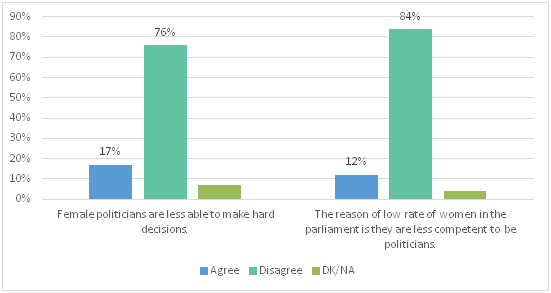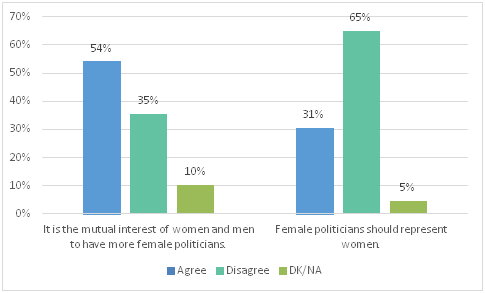As far as gender equality, gender roles, and stereotypes are concerned, the Hungarian society is not as traditional as it might seem in the light of the communication of the current government. Contrary to expectations, it considers women to be far more competent to be politicians than the current leaders of the country. Moreover, voters are much more open to female politicians than that critical 10% and 0% indicates – the proportion of women in the Hungarian Parliament and the government at the moment. In order to make a change, different actors must discuss the problems of gender more openly, as well as to address the difficulties women face in their careers (with special regard to family obligations), find allies to cooperate (including party politics), and support both women and men to fulfill their full potential.
These were the main findings of the “Women in Politics” conference organized by Friedrich Naumann Foundation and Integrity Lab on April 19, 2017, in Budapest, Hungary. The aim of the event was to present the results of the research cunducted recently by the Integrity Lab. The conference brought together various stakeholders: politicians, NGOs, activists, representatives of the media, students and citizens, who are committed to fighting for gender equality.
The event was opened by Mr. H. E. Niklas Trouvé, Swedish Ambassador to Hungary, the representative of the first (and so far the only) feminist government in the world. He described the meaning of the word ‘feminism’ in the current social and political context, and explained the fundamental nature of a government committed to gender equality and the representation of different social groups in the political and economic leadership. He emphasized that better, more affective andfair decisions are made when the decision-making bodies are more diverse – in politics as well as in the private sector.
Representative Opinion Polls, November 2016 and March 2017
 Some of the results of the representative opinion polls presented at the conference were earlier published on 4liberty.eu (here, here, and here). The latest results show that the greater part of the society considers having more female politicians to be the mutual issue and interest of men and women. The most important finding is that men agree with this statement just as much as women. Moreover, it is clear that Hungarians do not expect female politicians to represent only women – however, this statement was supported by significantly more women than men.
Some of the results of the representative opinion polls presented at the conference were earlier published on 4liberty.eu (here, here, and here). The latest results show that the greater part of the society considers having more female politicians to be the mutual issue and interest of men and women. The most important finding is that men agree with this statement just as much as women. Moreover, it is clear that Hungarians do not expect female politicians to represent only women – however, this statement was supported by significantly more women than men.
Representative Opinion Poll, March 2017
 What Do Female Hungarian Politicians Say?
What Do Female Hungarian Politicians Say?
Another key focus of the research was placed on the experiences of the currently active female politicians. Integrity Lab conducted personal interviews with those who ran as candidates in a constituency in the national elections in 2014. While talking about the main reasons of low participation of women in political leadership, all participants mentioned the traditional feature of Hungarian society as far as gender issues are concerned: stereotypes and gendered expectations (with special regard to family obligations), which are hard to meet if a woman wants to be successful in politics.
The respondents also emphasized that during their election campaigns they had to face much less negative attitude, questioning of competence, sexism or any other form of attacks from the voters as female candidates than it could be expected from the more and more aggressive and sexist tone at the “highest” levels of Hungarian politics – in the Parliament or political platforms of other parties. They welcomed a slow, but visible positive change in the attitudes of the Hungarian society, and they all agreed that a further change is possible and necessary in terms of the number and the role of women in Hungarian politics.
Concerning the ways to promote gender equality and raise the rate of women in leadership, they highlighted the need for supporting women by their partners, families, and communities in order to pursue their goals. This can be done only if men and women share their experiences in life in a fair manner, negotiate division of labor more consciously, and if there is a constant effort to reflect on these experiences with regard to everyone’s role in a relationship, community or an organization – based on their capabilities and ambition, not their gender.
Furthermore, mentoring and networking are necessary if such a change in Hungarian mindset is to occur. All participants all urged political parties and private companies to help women in this regard. As for the practical tools to promote women in politics, the respondents’ answers related to the compulsory quotas in political parties or in any organization were divided, but all interviewed female politicians agreed that education system, the media, and political parties should play a much bigger role in making Hungarian society more open towards gender equality.
Was Everything Better in the Good Ol’ Days?
The speakers of the first panel, Mrs. Kinga Göncz, former foreign minister and member of the European Parliament, and Mrs. Ildikó Lendvai, former leader of the then governing Socialist Party, both confirmed the main findings of the conducted research. They emphasized that the current all-male government is a significant step back in the development of Hungary. Mrs. Ildikó Lendvai reflected on the opinion polls by stating that it is mostly the political parties (and not the voters) who are to blame for the situation of women in politics. According to her, Hungarian voters are much more progressive than the political parties (especially Fidesz) think. She also stressed the urgent need for systematic changes and institutional tools in Hungary to help women to be able to coordinate their personal, family life and their careers – especially when they hold leadership positions. Mrs. Göncz agreed that the current government and political discussion represent a much more traditional and hostile attitude towards women than the society. She also pointed out that women should have more affective representation of their interests on every level of society. Both speakers shared the view that the current situation of women in politics is also an issue of Hungarian democracy as such and that it is related to the problems of many disadvantaged, vulnerable social groups. Their key recommendation for potential female politicians or leaders was to first and foremost find mentors and build partnerships and alliances wherever they can.
Whose Business Is It?
The second panel hosted representatives of various sectors who are committed to promoting gender equality. Mrs. Edina Heal, director of Google Hungary, emphasized the possibilities of technology in reaching out to people more directly than ever before, and that if someone wants to make a change in society, commitment is not enough. Such people should act and try to make an impact in their own environment – let it be a political party or a private company. Mr. András Volom, the youth delegate of Hungary to the United Nations, claimed that Hungarian men are also concerned about the questions and problems of gender equality. He also stressed the need for a more open and active public discussion on these topics, as well as for promoting more attractive role models for both, men and women, based on their personal preferences and choices – and the necessity for doing so with the participation of again both, men and women. He emphasized the fact that the issues concerning gender equality (especially the lack of women in leadership positions) are related to the general attitude of society – eg. low democratic participation, and the lack of young generations’ representation in decision making. He called for more civil activism and participation in social movements – otherwise, these changes will not be possible no matter how much some people need them.
In response to the question “To what point should the freedom of women extend?”, Mrs. Anna Réz, co-founder of the Glass Ceiling blog, said that the representation of women in politics and gender equality in general should be a more important topic in politics. However, she stressed that due to the limited political power of progressive Hungarian parties and because the current government is not interested in this issue at all, only more political activism (especially among women) can truly bring about such a change.



